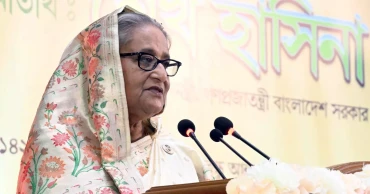Transparency
TIB expresses frustration as ACC Ordinance approved without key reform provision
Transparency International Bangladesh (TIB) has expressed deep disappointment and indignation over the Advisory Council’s final approval of the Anti-Corruption Commission (ACC) Ordinance ‘ignoring strategically important recommendations.’
The recommendations were essential for ensuring transparency, accountability and institutional independence of the anti-graft body, it said in a statement on Friday (November 28).
The exclusion of “Selection and Review Committee” from the final ordinance despite being included in the July Charter is not only disappointing, but also indicates that like almost all other cases of reform proposals the state reform agenda has become hostage to the conspiracies of anti-reform circles within the government, it added.
TIB also questions whether by denying the provision to make ACC accountable as much as independent, the Chief Adviser, as the head of the consensus commission and the groundbreaking decision-maker to form the 11 reform commissions, is trying to send a message to all including political parties, that ‘state reforms are just a rhetoric for the Government.’
Read more: ACC’s year of mixed outcomes: 249 cases closed, yet acquittals dominate
Noting that the ACC Reform Commission had recommended the formation of a “Selection and Review Committee” considering the experience of the past two decades, the opinions of all stakeholders, international best practices, and the political and bureaucratic context of Bangladesh in order to ensure that the ACC does not continue to function as a tool of protection of those in power and harass political or other opponents, TIB Executive Director Dr. Iftekharuzzaman said.
“This proposal was made to overcome the dire situation of ACC as the institution has been suffering from a lack of public trust since its inception, as a puppet of vested quarters, it has become a tool of protection for those in power and harassment of opponents,” he said.
It is regrettable that the government has failed to understand the strategic value of this recommendation to transform the ACC into a truly accountable, independent, and impartial institution through half-yearly reviews, public hearings, and recommendations by the proposed committee, he said.
ACC’s year of mixed outcomes: 249 cases closed, yet acquittals dominate
“For a government responsible for state reforms, this is a self-contradictory and anti-reform precedent,” he added.
Dr. Zaman further said the matter is even more disappointing because according to reliable sources, at least seven Advisors have opposed this proposal at the Cabinet meeting.
“Yet they know that all the political parties that signed the July Charter have fully agreed on this provision. Before creating such a bad precedent of violating the July Charter, why the government does not realise that through this the Government is by itself actually encouraging political parties to violate the July Charter? Why then unprecedented bloodletting sacrifices were made? What kind of state reform is it that blocks the way to effectively curb corruption?” he questioned.
The draft of the ordinance that TIB had the opportunity to review seemed to be in some ways of a higher standard than the existing law for which the organization commends the government, it said.
TIB calls for full disclosure of agreements with foreign cos on Laldia, Pangaon terminals
However, the TIB Executive Director has expressed deep disappointment and regret as according to reliable sources, in addition to the mentioned issue several other important strategic recommendations on which political consensus was achieved have been omitted.
“This can be nothing but a corruption-enabling and anti-reform stance of vested interests and influential quarters within the government,” he added.
3 months ago
NBR moves to digitalize tax audit selection to curb harassment and enhance transparency
The National Board of Revenue (NBR) has initiated a plan to digitize its tax audit selection process, replacing the long-standing manual method, to eliminate human interference and restore taxpayer confidence.
The move comes in response to ongoing complaints from taxpayers who claim the existing manual system exposes them to unnecessary harassment. NBR Chairman Md Abdur Rahman Khan confirmed the development: “We have begun working on digitizing the selection process to ensure it is objective and transparent.”
He acknowledged NBR's "image crisis" concerning how tax audit files are selected. "Taxpayers often complain that the manual selection process is subjective, and this has damaged trust in the system," he said. "Our goal is to eliminate any confusion by fully automating the audit selection process, free from human intervention."
In line with the NBR's ongoing transition to a digital system, the authority has temporarily suspended the selection of new tax files for audits. Following the formation of the interim government, NBR's member of taxes (tax audit, intelligence and investigation), Md Alamgir Hossain, issued a directive instructing all field-level tax offices to halt new audit selections until further notice. The decision aims to address the complexities faced by both taxpayers and tax officials under the existing manual process.
NBR to focus on out-of-court settlement of tax disputes to boost revenue
Bangladesh continues to grapple with one of the lowest tax-to-GDP ratios in the South Asian region—just 7.3%. In contrast, neighboring countries like India (12%), Nepal (17.5%), and Bhutan (12.3%) have significantly higher ratios. Moreover, only 5.2% of Bangladesh's population are registered as taxpayers, a stark contrast to India’s 23.08%.
Currently, 67% of the government’s revenue comes from indirect taxes. The NBR has acknowledged the need to shift this dependency toward direct taxes. The NBR chairman has said they are working to broaden the tax net in a way that is more convenient for taxpayers, encouraging compliance while reducing the burden of indirect taxation.
The implementation of the Income Tax Act 2023 has introduced new audit guidelines that have raised concerns about potential increased bureaucracy and costs for taxpayers. Under the guidelines, taxpayers may face multiple stages of interrogation, which some fear could open the door to underhand dealings.
To combat these concerns, the NBR has been developing specialized software, known as the "Risk Management Engine," which is designed to bring greater transparency to the tax audit process. The software will link with other government agencies to gather data and select tax files for audit based on risk factors, helping to detect tax evasion more effectively.
Read more: How to file your Tax Returns in Bangladesh
1 year ago
Highway Police introduce ‘body worn camera’ to ensure transparency, speedy police service
In an effort to ensure the quality of the police service, transparency, accountability and professionalism, Highway Police has introduced modern technology ‘body worn camera’.
Inspector General of Police Chowdhury Abdullah Al-Mamun inaugurated the service at Highway Police's 'Service Week-2024' ‘Service Week-2024’ at Rajarbagh Police Line on Tuesday.
Beef price higher by upto Tk 50 per kg in a month
Home Minister Asaduzzaman Khan was inaugurated the ‘Service Week-2024’
Besides, an app identified as ‘Hello HP' was launched to provide quick service to untoward accidents on highways.
Saraswati Puja to be celebrated Wednesday
The Highway Police can provide services within 20-25 kilometers areas after getting information through the app.
There are 22,000 km highways across the country and of these 2,291 km are under the control of the Highway Police.
DMP forms 'quick response team' to ease movements of SSC examinees
Additional IGP of Highway Police Shahabuddin, said through the body worn cameras, they are monitoring all operational activities of highway centrally and regionally.
Besides, through the HP app, commuters can avail the service of highway police, he said.
2 years ago
13 Citizens demand transparency in silt removal, river digging
Thirteen citizens from different professions on Wednesday demanded an end to irregularities and corruption in the regular removal of silt to keep the navigability on inland waterways for plying water vessels normally throughout the year.
They also demanded transparency and accountability in the ongoing river digging projects to rescue extinct rivers and waterways and to stop wastage of hundreds of crores of the state fund.
They made this demand to authorities concerned in a joint statement.
The government has been providing sufficient allocation to BIWTA every year for regular silt removal of waterways, the statement said. However, due to navigability crisis, the movement of passenger and cargo ships on important waterways including Dhaka-Barishal is severely disrupted.
As a result, some launch owners have already closed their business. Besides, many more vessel owners are thinking to close their business due to anger and frustration, it said.
Citizens complain that several mega projects have been undertaken to dig large rivers to restore extinct waterways and rivers by the direction of the Prime Minister, ‘But, in most cases, the desired success has not been achieved,’ they said.
According to the statement, the Executive Committee of the National Economic Council (ECNEC) on October 2, 2018, approved the ``Navigability Development and Restoration of the Old Brahmaputra, Dharla, Tulai and Punarbhaba Rivers'' project at a cost of Tk 4,371 crore.
Although 70 percent of the allocated money has already been spent, only 50 percent of the project work has been completed in four long years.
In the statement, 13 citizens complained that public money is being wasted due to lack of transparency and accountability. In order to stop these irregularities and corruption, they strongly demanded that information on silt removal in capital and maintenance dredging and river digging through mega project be regularly published in the media.
The signatories of the statement are- the former director general of water resources planning organisation and prominent environmentalist engineer M. Inamul Haque, Vice President of Consumer Association of Bangladesh (CAB) SM Najer Hossain, prominent children's organiser and heroic freedom fighter Nurur Rahman Selim, Chief Executive of Nagorik Uddog Zakir Hossain, General Secretary of Udichi Shilpi Gosthi Amit Ranjan Dey, Senior Vice President of Begombazar-Moulbhibazar Bonik Samity Haji Mohammad Shahid Mia, Member Secretary of Safe Waterway Implementation Movement Aminur Rasul Babul, Senior marine engineer Abdul Hamid, the executive director of Dwip Unnayan Sangstha the heroic freedom fighter Rafiqul Alam, the executive director of Poverty Immunisation Assistance Center for Everywhere (PEACE) Ifma Hussain, the president of Alokit Garments Sramik Federation Bappidev Borman, central coordinator of Janalok Rafiqul Islam Sujan and Purana Dhaka Nagorik Uddog president Nazim Uddin.
2 years ago
JS Affairs: 34,036 applications for design approval received by Rajuk
State Minister for Housing and Public Works Sharif Ahmed on Thursday said that some 34,036 applications for design approval have been received in Rajuk since the start of online design approval process in 2019.
“Among those, 22, 933 applications have been approved as those were submitted with necessary documents,” he said.
The minister said this while responding to a tabled question from ruling party MP Anwar Hossain Khan.
Ahmed said that the Rajuk launched an online service to ensure transparency and accountability in design approval from May 2, 2019.
A total of 81 applications were rejected as per rules due to various inconsistencies.
At present, 3,859 applications are under process at various stages in the capital development authority.
Apart from this, 7,164 applications have been forwarded to the applicants at various times due to non-submission of required documents by the concerned owners or representatives.
In response to the question of ruling party MP Mamunur Rashid, Education Minister Dipu Moni said that currently there are 20,316 secondary level educational institutions under the secondary and higher education departments across the country.
Read more: Rajuk on its way to redevelop centuries-old Old Dhaka
Among them, 2,357 lower secondary schools (6th to 8th), 16,516 secondary schools (6th to 10th) and 1,443 schools and colleges.
In response to the question of ruling party MP Nurunnabi Chowdhury, Science and Technology Minister Yeafesh Osman said that BCSIR has so far invented 1,45 technological methods and obtained patent rights for 376 methods.
So far 263 technologies/methods have been leased to more than 300 industrialists or organisations.
In response to the question of AL MP Manjur Hossain, the education minister said that the total number of Alia Madrasahs under the Technical and Madrasa Education Department is 9,292.
Of these, there are three government madrasas.
There are 8,229 madrasas under Monthly Pay Order (MPO) and 1,600 non-MPO madrasas.
Apart from this, there are 8,972 madrasas run independently.
3 years ago
Govt wants prompt disposal of cases to ensure transparency, accountability: PM
Prime Minister Sheikh Hasina today said the government wants to ensure justice for all with prompt disposal of cases, and ensure transparency and accountability in the country.
“We want every citizen of the country to get justice. We want prompt disposal of cases. We want to ensure transparency and accountability… we want to establish that environment,” she said.
The prime minister said this while addressing the inaugural session of the 59th Annual Council of Bangladesh Judicial Service Association at Bangabandhu International Conference Center (BICC).
Sheikh Hasina said the government is working tirelessly to ensure the wellbeing of people — for a bright and secured future for them.
“Let us ensure rule of law for the people of Bangladesh, so they can have a better life. We will establish Bangladesh that was dreamt by the Father of the Nation Bangabandhu Sheikh Mujibur Rahman,” she said.
Read more: Zia, Ershad and Khaleda Zia turned Bangladesh into a ‘nation of beggars’: PM
The prime minister said that members of the parliament have passed laws alongside making amendments to ensure security and welfare of the people while judges are ensuring justice for all.
“As long as I am in power, I will do whatever necessary for the development of the judiciary,” she said.
She said her government has formed special tribunals to dispose cases filed under the antiterrorism act.
If the trials of anti-terrorism cases end quickly, those involved in terrorism will be discouraged, she hoped.
The PM said patterns of terrorism and militancy have changed with the advent of newer technologies, and crimes are being enabled by technology.
“We have enacted a law to contain cybercrimes. Many people say many things, but the fact is that law is necessary as the number of cybercrimes has gone up immensely,” she said.
She called upon all, including parents, teachers, and religious leaders, to be involved in anti-terrorism and anti-militancy awareness campaigns across the country.
“We have to pay special attention so that no chid gets involved in militancy,” she added.
Referring to militant attacks in Jhalakathi and Gazipur courts, she said her government has taken measures so that judges can return home safely after delivering verdicts.
The PM said as many as 101 tribunals are now working across the country to deal with cases of women and children repression; seven tribunals are assigned to work on human trafficking cases.
To bring dynamism in the judiciary, she said a total of 1227 judges were appointed in the lower courts since 2009 till date, while a process is underway to recruit 200 judges more.
Read more: Anti-liberation forces and killers of Bangabandhu are always trying to make Bangladesh a ‘failed state’: PM to AL activists
Recalling the contribution of Father of the Nation Bangabandhu Sheikh Mujibur Rahman for the development of the judiciary, she said Bangabandhu had scrapped a Pakistani era law, paving the way for appointing women in the judiciary.
The prime minister urged judges to consider the situation before Awami League assumed power in 1996, saying, “You (judges) will see a complete change.”
She said her government has continued the trial of war criminals, confronting obstacles at home and abroad, adding that she had received many international phone calls, including from heads of states, when her government initiated measures to try war criminals.
The prime minister thanked Judge Golam Rasul for his bravery in delivering the judgement over the brutal assassination of Father of the Nation Bangabandhu Sheikh Mujibur Rahman, overcoming many hurdles.
She said the BNP-Jamaat alliance called hartal on the verdict day (November 8, 1998).
The BNP-Jamaat alliance government later awarded the killers of Bangabandhu by posting them in foreign missions and rehabilitated them in politics, she said.
She also said military dictator Ziaur Rahman freed 11,000 war criminals from jails to stop the trial of the anti-liberation elements that was initiated by the Father of the Nation.
The prime minister vowed to build a developed, prosperous 'Smart Bangladesh' by 2041 to give the people a better life.
Law Minister Anisul Huq, Law Secretary Md. Golam Sarwar and Bangladesh Judicial Service Association President AHM Habibur Rahman Bhuiyan also spoke at the programme. A documentary on judicial service was screened at the programme.
3 years ago
Glass act: Scientists reveal secrets of frog transparency
Now you see them, now you don’t.
Some frogs found in South and Central America have the rare ability to turn on and off their nearly transparent appearance, researchers report Thursday in the journal Science.
During the day, these nocturnal frogs sleep by hanging underneath tree leaves. Their delicate, greenish transparent forms don’t cast shadows, rendering them almost invisible to birds and other predators passing overhead or underneath.
But when northern glass frogs wake up and hop around in search of insects and mates, they take on an opaque reddish-brown color.
Read more: Canadian polar bears near 'bear capital' dying at fast rate
“When they’re transparent, it’s for their safety,” said Junjie Yao, a Duke University biomedical engineer and study co-author. When they’re awake, they can actively evade predators, but when they’re sleeping and most vulnerable, “they have adapted to remain hidden.”
Using light and ultrasound imaging technology, the researchers discovered the secret: While asleep, the frogs concentrate, or “hide,” nearly 90% of their red blood cells in their liver.
Because they have transparent skin and other tissues, it’s the blood circulating through their bodies that would otherwise give them away. The frogs also shrink and pack together most of their internal organs, Yao said.
The research “beautifully explains” how “glass frogs conceal blood in the liver to maintain transparency,” said Juan Manuel Guayasamin, a frog biologist at University San Francisco of Quito, Ecuador, who was not involved in the study.
Exactly how they do this, and why it doesn’t kill them, remains a mystery. For most animals, having very little blood circulating oxygen for several hours would be deadly. And concentrating blood so tightly would result in fatal clotting. But somehow, the frogs survive.
Read more: Oldest DNA reveals life in Greenland 2 million years ago
Further research on the species could provide useful clues for the development of anti-blood clotting medications, said Carlos Taboada, a Duke University biologist and study co-author.
Only a few animals, mostly ocean dwellers, are naturally transparent, said Oxford University biologist Richard White, who was not involved in the study. “Transparency is super rare in nature, and in land animals, it’s essentially unheard of outside of the glass frog,” White said.
Those that are transparent include some fish, shrimp, jellyfish, worms and insects — none of which move large quantities of red blood through their bodies. The trick of hiding blood while sleeping appears to be unique to the frogs.
“It’s just this really amazing, dynamic form of camouflage,” said White.
3 years ago
Fiscal Transparency: Bangladesh made significant progress, still didn’t meet requirements
Bangladesh government made significant progress towards meeting international requirements in fiscal transparency, but it still fell short of the minimum standard, says a new report released by the US.
The 2022 Fiscal Transparency Report says that fiscal transparency informs citizens how government and tax revenues are spent and is a critical element of effective public financial management.
The report was released yesterday (September 9, 2022).
Fiscal transparency provides citizens a window into government budgets and those citizens, in turn, hold governments accountable. It underpins market confidence and sustainability.
Also read: Fiscal policy support needed for economy to tackle inflation: CPD
The government of Bangladesh did not meet the minimum requirements but made significant progress in fiscal transparency, the report said.
Since 2008, in consultation with other relevant US agencies, the Department of State has conducted fiscal transparency assessments of governments that receive US foreign assistance.
The Fiscal Transparency Report reviews efforts by 141 governments (and the Palestinian Authority) to meet the minimum requirements of fiscal transparency; assesses those governments that did not meet the minimum requirements; and indicates whether governments that did not meet the minimum requirements of fiscal transparency made significant progress toward meeting the requirements.
Read How to safely send remittance to Bangladesh?
How to improve the fiscal transparency of Bangladesh?
The US report says Bangladesh’s fiscal transparency can be improved by:
— Preparing budget documents according to internationally accepted principles.
— Ensuring that the supreme audit institution meets international standards of independence and has sufficient resources.
— Publishing timely audit reports that contain substantive findings, recommendations, and narratives.
— Making basic information about natural resource extraction awards public and consistently available.
Read Hope amidst forex crisis: Bangladesh received $2.03bn remittance in Aug
During the review period, the government made significant progress by publishing its end-of-year report within a reasonable period.
It also made its executive budget proposal and enacted budget widely and easily accessible to the public, including online.
Information on debt obligations was publicly available.
Budget documents provided a reasonably complete picture of the government’s planned expenditures and revenue streams, including natural resource revenues.
Financial allocations to and earnings from state-owned enterprises were included in publicly available budget documents.
Also read: Universal Pension Scheme from new fiscal year
Information in the budget was considered generally reliable, although budget documents were not prepared according to internationally accepted principles.
The government’s supreme audit institution reviewed the government accounts, but its reports did not contain substantive findings and were not made publicly available within a reasonable period.
The supreme audit institution did not meet international standards of independence.
The government specified in law or regulation and appeared to follow in practice the criteria and procedures for awarding natural resource extraction contracts and licenses.
Read Bangladesh receives $2.09 billion remittance in July; highest in 14 months
Basic information on natural resource extraction awards was not consistently made available to public.
2022 Fiscal Transparency Report (Full): https://www.state.gov/fiscal-transparency-report/.
3 years ago
President urges transparency and accountability in government spending
President M Abdul Hamid on Sunday asked the authorities concerned to ensure transparency in government expenditures for the sake of public interest.
The president made the call when Auditor General and Comptroller Muslim Chowudhury presented the annual audit to him at Bangabhaban in the evening.
During the meeting, the CAG briefed the president on various aspects of the report.
"Audit is very important to ensure transparency and accountability in government expenditures,"President Hamid said.
Also read: President urges PSC to accelerate recruitment for govt posts
The president also directed the CAG to intensify the audit activities to settle the unresolved audit objections on time.
Later, a delegation led by the Chairman of the Bangladesh Accreditation Council Prof. Dr. Mezbah Uddin Ahmed presented the first annual report of the Council to President Hamid.
The chairman of the Accreditation Council briefed the president on various aspects of the report and its overall functions.
Hamid directed the Accreditation Council to play its role in ensuring transparency and accountability in the overall activities including education and research in the universities.
The president also suggested bringing the activities of the university under monitoring to ensure the quality of higher education.
Also read: President Hamid receives 10 names for EC proposed by search committee
Secretary to the President's Office Sampad Barua, Military Secretary Major General SM Salah Uddin Islam, and Press Secretary Joynal Abedin were present on the occasion.
3 years ago
Civil society leaders urge transparency in Rohingya management
The Cox's Bazar Civil Society and NGO Forum (CCNF), a network of local NGOs and CSOs, on Sunday demanded transparency and local government participation in the Rohingya response management.
At a virtual press conference the CCNF leaders also demanded a parliamentary caucus on the issue.
Read:Crimes against Rohingyas: ICC Prosecutor seeks joint efforts to deliver justice
They urged a ban on use of plastic andcgroundwater and a limited use of bamboo as part of Rohingya management.
Abu Morshed Chowdhury of PHALS and Rezaul Karim Chowdhury of COAST Foundation conducted the press conference.
Hamidul Haque Chowdhury, Chairman of the Ukhiya Upazila Parishad spoke as the chief guest.
Imam of Nowzowan demanded that in respect of joint need assessment local organizations should also be involved.
Neelema Akter Chowdhury of Agrajatra said that, government contribution should be recognized in joint response management, as the government has already made $400 million investment in Bashanchar.
Nazrul of BAPA (Bangladesh Poribesh Andolan) stated that there is a lot of plastic and other waste in the Rohingya camp, and NGOs should be creative in this regard to innovate alternatives.
Surface water should be preserved and used, while groundwater extraction should be stopped now, he said.
He also suggested treatment of Naf river's water for use.
Agrajatra's Helal advised all concerned to buy dried fish and salt from local producers to distribute in the camps.
Mukti Cox’s Bazar's Lutful Kabir Chowdhury repeated the Grand Bargain's call to channel 25% of funds through local and national NGOs.
Abu Morshed Chowdhury of PHALS urged that the joint response plan should be a live document so that local organizations will have space to participate at any time, sectors should be reorganized so that local organizations will have leadership.
Rezaul Karim Chowdhury of COAST demanded partnership policies from international actors aiming toward sustainable local civil society building in Cox’s Bazar, the partnership policy should be practiced in a transparent manner without conflict of interest.
Local NGOs should be informed, of their weakness while they have not selected as a partner, he said.
Read: Fortify Rights wins Anthem Award for Rohingya photography project
Hamidul Haque Chowdhury, the Chairman of Ukhiya Upazila Parishad demanded that all humanitarian agencies must take the participation of local government leaders during project preparation to implementation.
He expressed concern about the increasing number of termination of locals from the jobs by humanitarian agencies.
3 years ago








.jpg)







